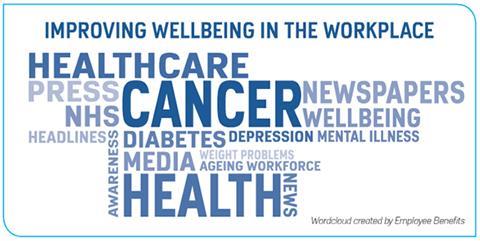
If you read nothing else, read this…
- Staff’s health should be prioritised.
- Media coverage can tarnish the way health problems are perceived, or give employees and employers confidence to discuss issues.
Keeping employees fit and healthy should be a key priority for employers because of the impact wellness has on productivity and retention. So should employers take note of how headlines might reflect in their workforce’s health?
Supporting mental illness in the workplace
The Group Risk Development (Grid) 2014 Employer research published in October 2014, found that stress and mental illness are the main causes of sickness absence. With these issues so prominent in the workplace, it is no wonder they are also abundant in the news.
The recent aircraft crash in the Alps, involving pilot Andreas Lubitz, brought mental health to the forefront of people’s minds, but not in a positive way. Emma Mamo, head of workplace wellbeing at charity Mind, says: “Thanks to the primarily sensationalised media reporting, many of the references linked mental health with danger.
“This type of reporting only served to fuel the stigma, which can prevent people speaking out and receiving support from their employer.”
Daryl Maitland, senior HR manager at Cafcass, also understands the importance of mental health awareness. He says: “I buy into the concept that there’s a connection between physical and mental health. If an employer cares about wellbeing, it can really help improve mental health because [employees] know they care.”
Headlines can improve workplace support with mental illnesses, says Maitland. “If there is lots of coverage of a health problem, some employees will come to expect help around it from their employer.”
Increasing diabetes awareness
According to a study by the NHS published in February 2014, 3,208,014 adults had diabetes in 2013, an increase of more than 163,000 compared with 2012. A rise in a condition such as diabetes can put a considerable strain on the NHS and workplaces. Mike Blake, director at PMI Health Group, explains: “Illnesses such as diabetes and obesity are inversely linked to productivity and lost time.”
HIghlighting the issue in the media can help employers promote awareness in the workplace. Blake says: “Headlines can help healthcare matters stick, and make employees worry about their own health more rather than bury their heads in the sand. They also mean employers become part of the solution.”
The aforementioned NHS figures also revealed that 90% of diabetes cases are type two, which tends to be caused by lifestyle choices and obesity levels. It can have extremely serious consequences on an employee’s health. Jeremy Chadwick, managing director of VSP Vision Care EMEA (Europe, the Middle East and Asia), says: “Unmanaged diabetes can lead to sight loss, cardiovascular diseases, strokes, amputations and early death.”
Employers can offer proactive support to help prevent diabetes by implementing initiatives such as exercise classes and by providing healthy-eating information.
Managing weight levels
Obesity is also a burning issue for employers: some 64% of UK adults are overweight, according to a Public Health England survey [name needed?] published in February 2014. To help prevent lifestyle-associated illnesses such as increasing obesity levels, Blake believes that senior staff must lead by example. He says: “Workplaces need to have a culture of fit and healthy staff, leading from the top, and giving incentives can create that. The trouble is that employers can be seen to be meddling, but headlines make it okay for employees to initiate asking for help.”
Ageing workforce
The ageing workforce brings challenges for employers in supporting the health of their staff. Some 37% of HR directors plan to review their benefits to meet older workers’ needs, according to research by MetLife Employee Benefits, which can only be a positive shuffle towards supporting the workforce as it works longer.
Michelle Rae, medical product manager at health insurance provider Cigna, believes that the issue of the ageing workforce is only just beginning to be recognised. She says: “The ageing workforce is a big issue, but it’s really starting to resonate with employers, which is great because the issue will only get worse.”
A healthy office environment
Sick building syndrome, an unhealthy building environment, has made its way onto numerous news agendas. Oliver Heath, biophilic design ambassador at global manufacturer of commercial carpet tiles Interface, says: “It has been suggested that sick building syndrome can have detrimental effects on wellbeing, potentially bringing on illnesses, such as a sore throat and sinus problems. It can also affect decision-making skills, increase absenteeism and reduce productivity, which can have a big impact on the effectiveness of a workforce.
“The good news is that to address these issues and ensure a workforce is performing effectively, there are some simple, inexpensive things employers can do to improve wellbeing. These include reducing office temperature, increasing ventilation and reducing carbon dioxide [CO2 ] levels.”
Cancer awareness
As highlighted in the news, cancer affects everyone in all walks of life. Yet, just 62% of male cancer patients feel supported by employers, according to YouGov research commissioned by Unum with cancer charity Maggie’s [name needed?] , published in September 2014.
Although cancer is appearing in headlines, some employers are not grasping its importance. This was reiterated by a study [name?] from Bupa, published in February 2015, which revealed that just 4% of employees say their employer has run cancer-related initiatives.
One employer, print provider Balreed, ran cancer awareness workshops in January, which were attended by all employees (see case study).
Stretching the NHS
It is no secret that the NHS is being stretched to its limits. This is a colossal difficulty that employers need to be aware of, because it calls upon them to offer more support. Blake agrees:“ NHS and general practitioner [GP] services are under pressure, which could indirectly create problems for employers if staff can’t get treated quickly.”
Mind’s Mamo adds: “NHS mental health services have always been underfunded but evidence shows that they have suffered cuts of about 8% in the last five years. This has an impact on employers because people can become unwell while waiting for treatment, and potentially need time off or even end up in hospital.”
JP Morgan provides staff with healthcare benefits to help work around the stretched NHS services. Adam Brookes, vice-president, employee benefits (UK), at JP Morgan, says: “Waiting times for NHS hospitals and GP surgeries are coming on very strongly in the news, which is why we provide all UK staff with private medical insurance [PMI].”
Staff also have access to a confidential employee assistance programme (EAP) and a private GP service, provided by Nuffield Health, entitling them to up to 12 appointments with a private GP annually.
Using headlines to promote health
But can the abundance of health issues illustrate their importance to employees? Chris Rofe, senior vice-president at Lockton Benefits, says: “There’s barely a month that goes by when there isn’t an awareness week of some sort. These kinds of public events, such as Mental Health Awareness Week and Movember [which raises awareness and money for male health issues in November] improve employee understanding.
“Employers should be looking to leverage anything in the public domain that has enough information for them to start conversations with staff. The holy grail of this is to help employees change their habits and attitudes.”
Health issues highlighted in the mainstream press can certainly bring home important messages for organisations. As Rae says: “Employers can’t give employees scare stories about their health, but they can hone in on what staff might want and need.”
Case study: Balreed boosts cancer awareness at work

Balreed ran workshops and screenings to highlight cancer awareness for employees in January 2015. All 204 employees of the managed print services provider attended.
The programme, provided by HealthScreen UK, offered male staff over the age of 40 a free prostate-specific antigen (PSA) test following a workshop. Invitations were extended to family and friends of female staff, as well as to men under 40.
The organisation created its ‘Be A Hero’ campaign when its managing director, Robin Stanton-Gleaves, was diagnosed with prostate cancer in 2014.
The scheme emphasised the importance of early cancer detection. Workshops took place at Balreed’s eight offices in Wakefield, Bristol, Birmingham, Maidstone and London.
Kim Mason, HR adviser at Balreed, says: “Cancer is all you read and hear about. It’s worrying to see younger people getting cancer, so raising awareness is important.
“The campaign encouraged our male-dominated workforce to make sure they’re aware of the signs and symptoms of cancer, and to feel comfortable enough to talk about it.
“It really had the desired effect, and by [Stanton-Gleaves] standing up and saying ‘this is what I have and this is what I have to deal with’, we’re encouraging a more open culture around health, which is now a general consensus.”

Rachel Dineley is partner, employment and pensions group, at DAC Beachcroft
How far should duty of care go?
A recent High Court case gives useful insight into approaches taken by courts to an employer’s duty of care in anticipating a worker’s psychiatric illness, and how to manage risks in that regard.
In Easton v B&Q, an experienced manager claimed for damages in respect of his nervous breakdown following workplace changes, which had caused him undue stress.
Although he had raised the issues with managers, the court found that his concerns had not been expressed in such terms as to put the employer on notice that there was significant risk, and there was no duty-of-care breach.
One in four people suffer from mental ill health at some point, and depression affects one in 12 of the working population, so the need to cater for such issues is unquestionable. Many employers could do more in providing training and affordable benefits.
Since Fit for Work is in its infancy, and may not inspire confidence in many, employers should be proactive in making the most of opportunities to maintain a healthy workforce; it’s plainly in their interests to do so.






























